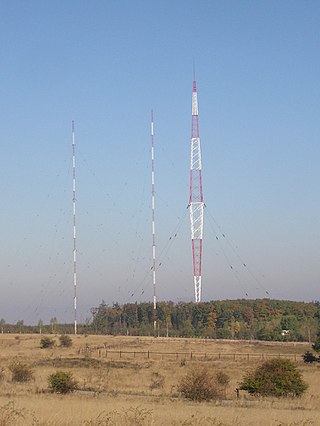Related Research Articles

Telecommunications in Bulgaria include radio, television, fixed and mobile telephones, and the Internet.
Egypt has long been the cultural and informational centre of the Middle East and North Africa, and Cairo is the region's largest publishing and broadcasting centre.
Telecommunications in France are highly developed. France is served by an extensive system of automatic telephone exchanges connected by modern networks of fiber-optic cable, coaxial cable, microwave radio relay, and a domestic satellite system; cellular telephone service is widely available, expanding rapidly, and includes roaming service to foreign countries.
Telecommunications in Gabon include radio, television, fixed and mobile telephones, and the Internet.
Jordan has a highly developed communications infrastructure. Jordan's telecom infrastructure is growing at a very rapid pace and continually being updated and expanded. Communications in Jordan occur across many media, including telephone, radio, television, and internet.
The following is an outline of communications technology in Morocco.
The People's Republic of China possesses a diversified communications system that links all parts of the country by Internet, telephone, telegraph, radio, and television. The country is served by an extensive system of automatic telephone exchanges connected by modern networks of fiber-optic cable, coaxial cable, microwave radio relay, and a domestic satellite system; cellular telephone service is widely available, expanding rapidly, and includes roaming service to foreign countries. Fiber to the x infrastructure has been expanded rapidly in recent years.
Telecommunications in Saudi Arabia have evolved early in the Kingdom since the establishment the Directorate of Post, Telephone and Telegraph (PTT) in 1926.
Telecommunications in the United Arab Emirates (UAE) is under the control and supervision of the Telecommunications and Digital Government Regulatory Authority which was established under UAE Federal Law by Decree No. 3 of 2003. From 1976 to 2006 the Emirates Telecommunications Corporation (Etisalat) was the sole telephone and telecommunications provider for the UAE. And while there were exceptions for free zones and modern housing developments, for the majority of the UAE, Etisalat held a monopoly on business and personal telecommunications services. In February 2006, this monopoly became a duopoly when a new telephone company and Internet service provider (ISP), du, was established to offer mobile services across the UAE and Internet and TV services to some free zone areas. However, due to geographical distribution of service areas, the companies do not compete for customers and thus effectively operate as monopolies. Earlier du provided triple play services to free zone areas under the name Emirates Integrated Telecommunications Company (EITC), which is still its legal name.
Communications in the United States include extensive industries and distribution networks in print and telecommunication. The primary telecom regulator of communications in the United States is the Federal Communications Commission.

Telecommunications in Azerbaijan provides information about television, radio, fixed and mobile telephones, and the Internet in Azerbaijan. The Azerbaijan economy has been markedly stronger recently and, not surprisingly, the country has been making progress in developing ICT sector. Nonetheless, it still faces problems. These include poor infrastructure and an immature telecom regulatory regime. The Ministry of Communications and Information Technologies of Azerbaijan (MCIT), as well as being an operator through its role in Aztelekom, is both a policy-maker and regulator.
Telecommunications in Tunisia includes telephones, radio, television, and the Internet. The Ministry of Communication Technologies, a cabinet-level governmental agency, is in charge of organizing the sector.
Portugal has a modern and flexible telecommunications market and a wide range of varied media organisations. The regulatory body overseeing communications is called ANACOM.
Telecommunications in Yemen provides information about the telephone, Internet, radio, and television infrastructure in Yemen.
Telecommunications in Iraq include radio, television, fixed and mobile telephones, and the Internet as well as the postal system.
Telephones - main lines in use: 110,300 (2007)
country comparison to the world: 137
Telecommunications in Cuba consists mainly of NTSC analog television, analog radio, telephony, AMPS, D-AMPS, and GSM mobile telephony, and the Internet. Telephone service is provided through ETECSA, mobile telephone service is provided through the Cellular Telephone Company of Cuba (CUBACEL) and, previously, Caribbean Cellular. Cuba's main international telecommunications links are through Intersputnik, with limited effectiveness of undersea telephone cables to the Americas, Spain, and possibly Italy due to underdevelopment.
Telecommunications in Djibouti falls under the authority of the Ministry of Communication & Culture.
Telecommunications in Ivory Coast include radio, television, fixed and mobile telephones, and the Internet.
Telecommunications in Costa Rica include radio, television, fixed and mobile telephones, and the Internet.
References
- 1 2 3 4 "Kuwait", World Factbook, U.S. Central Intelligence Agency, retrieved 16 February 2013
- ↑ Percentage of Individuals using the Internet 2000-2011, International Telecommunication Union, accessed on 19 August 2012.
